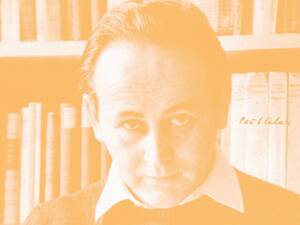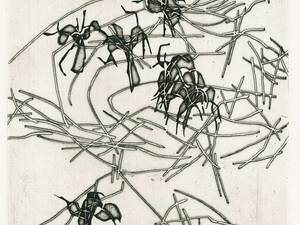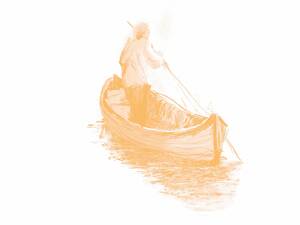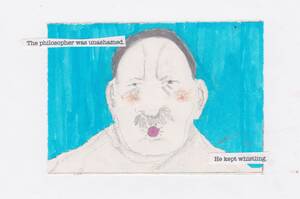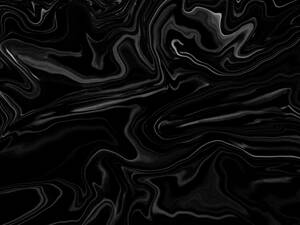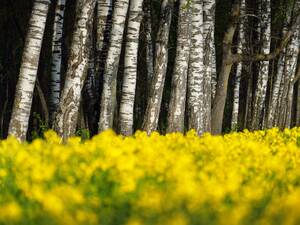Three Poems
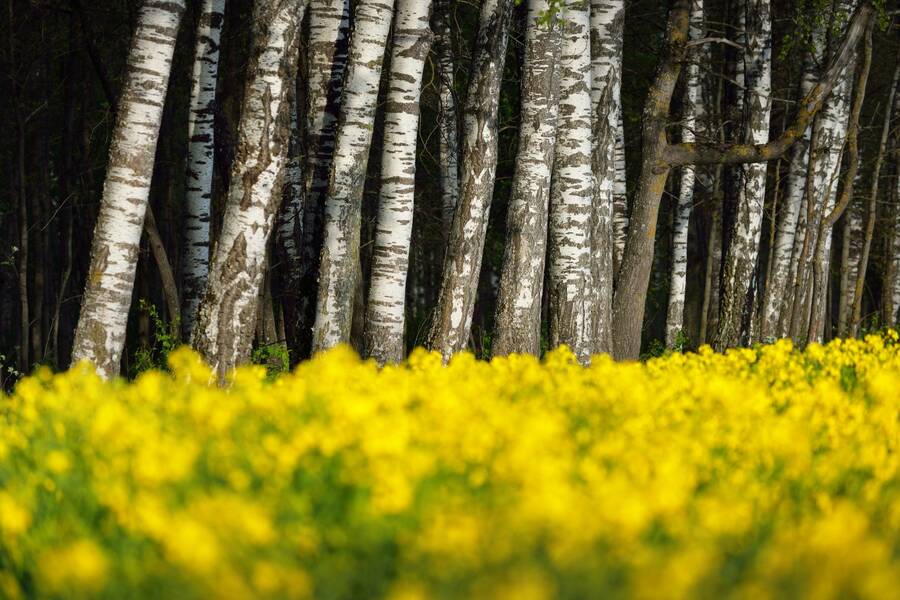
Click here to read the rest of the Paul Celan folio.
(English follows the German, below)
Selma Meerbaum-Eisinger, a younger cousin of Paul Celan, was a Jewish, German-language poet and translator who died in a Nazi labor camp in 1942, at the age of 18. She left behind a collection of 57 handwritten poems—52 originals, and five translations of works by other poets—in a hand-bound volume titled Blütenlese (Harvest of Blossoms). The manuscript miraculously survived the war, due to the dedication of her friends. Meerbaum-Eisinger’s poems draw from myths, songs, and the natural world, blending this material to capture small moments of tranquility amid the violence of antisemitism, express heartbreak, and shed light on the brutality of her experience in the ghetto. In haunting, lyrical verse, she creates an emotional counterworld constructed of rich imagery and stark music—a space of reflection and resistance.
– Carlie Hoffman
Den gelben Astern ein Lied
Sie blicken durch den Regen hell mich an
so licht, daß sie die Sonne mir ersetzen.
Und gar nichts von des Regens Trauer kann
die leuchtend gelbe Freude mir verletzen.
Auflachend neigen sie sich in dem Grün,
das rein und frisch ihr Lachen mir begleitet –
ich leg’ ihnen mein Lied zu Füßen hin,
weil sie mir eine Freude heut bereitet.
Song of the Yellow Asters
They look at me brightly through the rain,
bright as sun drenching over me.
Though the rain can’t mar their glow:
Laughing, they lean into green,
their pure and fresh laughter
accompanies me—
I place my song at your feet,
because today gives me joy.
—
Welkes Blatt
Auf der halbvergilbten Seite
liegt das dünne, gelbe Blatt,
liegt es traurig, zart und matt
wie ein Tränenblick ins Weite.
Und der Stengel ist so biegsam zart,
daß man fast des dünnen Kleides harrt,
das diese Gestalt bekleiden soll.
Und das Blatt ist wie ein Lied in Moll,
weil es an den Herbst gemahnt,
wie ein Kind, das traurig ahnt,
daß es krank ist und bald sterben soll,
ganz so süß und voll verhaltnem Weh . . .
So ist auch der letzte Schnee . . .
Dried Leaf
On the half-yellowed page
the pressed, yellow leaf
lies sad, tender, and dull—
a tearful gaze into the distance.
The stem is so brittle, frail,
that one almost believes in a feeble dress
made to cover the body with grace.
The leaf is a song in a minor key,
an omen for autumn
like a child who sadly knows
that they are sick, and death is close,
so sweet and full of temperate grief—
The final snow.
—
Nachmittag
Dünne Zweige wie weltferne Schleier
ranken sich aus schlanken Birkenstämmen
und die Stille, wie bei einer Feier,
ist, als wollte sie den blauen Himmel dämmen,
daß er nicht zu weit ins Vogelsingen sich ergieße.
Braune nasse Wege. Und ein erblühter Baum
ist so, als ob die Erd’ er neu erschließe,
Grüne Gräser sprießen kaum.
Alle Tannen sind ganz neu ergrűnt
und ein dünner, gelber Falter sich erkühnt,
sich auf eine sonnentrunk’ne Bank niederzulassen.
Einer grünen Fliege will das gar nicht passen:
Ist die Sonne nicht für sie allein?
Nur die Schlehdornspitzen wispern leise: Nein!
Afternoon
Thin twigs like otherworldly veils
emerge from slender birch trunks
and the silence, ceremonial,
as if shielding the sky
from the rapture of birdsong.
Muddy, brown paths. And a blossoming tree
discovers this new world.
Grass barely sprouts.
All the firs re-green
and a papery, yellow butterfly
dares to rest on a sun-drenched bench.
This does not suit a green fly at all:
isn’t the sun only for me?
Only tips of the blackthorn whisper: No!
Selma Meerbaum-Eisinger (1924–1942) was a Jewish, German-language poet from Bukovina. On December 16th, 1942, she died of typhus in the Michailowka labor camp. She is the author of Blütenlese (Harvest of Blossoms).
Carlie Hoffman is the author of This Alaska (Four Way Books, 2021), the founder and editor-in-chief of Small Orange Journal, and a Lecturer in Creative Writing at Purchase College, SUNY. Her second collection is also forthcoming with Four Way Books in 2023.

